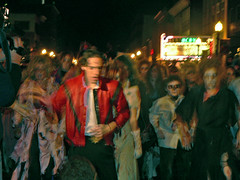NB: This is a copy of the post I put together for the UTC Library blog, but I felt it was important enough that I wanted to cross post it. Forgive me the horrific blog ettiquette faux pas.
Completely and utterly brilliant keynote at the ACA Summit by Jo Ellen Parker, tracing the changes in the University in the 1860’s through the early 20th century and comparing them to the sea change coming over the next 20-30 years via technology.
As a teaser: her central point, among many phenomenal side points, was that the University will be moving towards a less centralized/compartmentalized model, and towards a more fluid, changable model. One of her questions was, paraphrased: “What happens when the library is no longer a place where information is stored, and is instead a method or activity?”
EDIT: Snippets from actual text follows…Jo Ellen Parker was kind enough to share her early draft with me, and here are some of the high points. The first exerpt is her illustration of another major shift in the Academy, when writing allowed education to move from the “seek a teacher, and listen” mode to “learning anytime, anywhere” mode.
…in the Phaedrus, where Plato depicts Socrates and Phaedrus talking a walk and talking of love and truth. Socrates tells Phaedrus a story about the Egyptian god Theuth, who presents various “divine†arts to the king Thamus – number, calculation, geometry, astronomy, and above all writing. Thamus is less than impressed, however, about writing in particular, saying “If men learn this, it will implant forgetfulness in their souls; they will cease to exercise memory because they rely on that which is written, calling things to remembrance not from within themselves but by means of external marks. . . . And it is no true wisdom that you offer your disciples, but only its semblance, for by telling them of many things without teaching them you will make them seem to know much, while for the most part they know nothing. . . “ After Phaedrus agrees that Thamus has a point, Socrates goes on to say that “anyone who leaves behind him a written manual, and likewise anyone who takes it over from him, on the supposition that such writing will provide something reliable and permanent, must be exceedingly simple-minded.†Written words “seem to talk to you as though they were intelligent, but if you ask them anything about what they say, from a desire to be instructed, they go on telling you the same thing forever.†In Socrates’ view, a book is a sort of inanimate parrot, mindlessly repeating a form of words of which it can have no understanding.
[. . . ]
Of course, Socrates speaks more principled objections as well. By relying on writing to preserve information, the argument goes, students would cease to exercise memory. (I seem to remember many similar discussions about the introduction of calculators and their effect on basic math skills in my own education.) But most serious of all seems to be the charge that books are “dead.†They can only repeat themselves, without interaction or nuance or growth, and so are a poor substitute for the live interplay of human minds through discourse, which in the Socratic view is the true mode of intellectual seeking. As I think about this point, I have to wonder whether Socrates would have found blogs and wikis, with their ever changing nature and open invitation to exchange, somewhat less objectionable than Greek scrolls. . . .
She goes on to discuss the changes in the American university before and at the turn of the 20th century. Within a roughly 40 year period, most of the things we take for granted about academia were invented or imported: the necessity of the PhD, tenure, universities as knowledge production facilities, the academic publishing model and specialization over generalization of learning. All of these things came into being in a terrifically short time, and one can only imagine the shock of the existing college professor in trying to hang on to the old ways of doing things.
I’ll close this with her paragraph on libraries…again, very forward thinking.
And, to bring us back to where we started, sort of, I believe that something similar will happen, indeed is happening, to libraries. James Duderstadt, former president of the University of Michigan and a very thoughtful commentator on higher education, poses a nice thought experiment: Imagine that all the information currently in your campus library could be contained in a device roughly the size and shape of a football. What would that mean for your library? One thing it would mean, obviously, is that the definition of the library as a physical space built to centralize and protect collections must be radically changed. Once regarded as repository of an institution’s accumulated intellectual and informational capital, the library must become an access point for information and materials, both digital and analog, owned by many different entities and located who knows where. What does a library look like that is a launching pad into cyberspace for students and faculty? What kinds of skills do librarians need to connect users with information in multiple media from anywhere on the globe? To put it really bluntly, how can your college librarian compete with Google to provide services to NetGen students and very soon NetGen faculty? Another prediction I have is that just as the barriers between disciplines and departments will become permeable and flexible, the distinction between library and student center, library and technology center, library and classroom will do the same.


